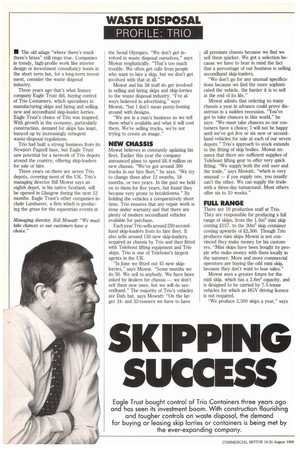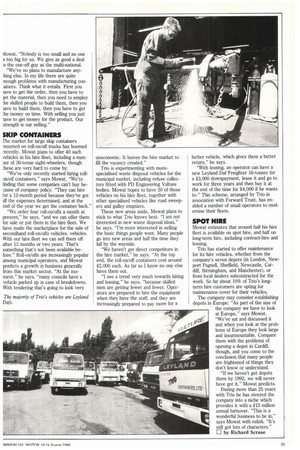SKIPPING SUCCESS
Page 28

Page 29

If you've noticed an error in this article please click here to report it so we can fix it.
Eagle Trust bought control of Trio Containers three years ago and has seen its investment boom. With construction flourishing and tougher controls on waste disposal, the demand for buying or leasing skip lorries or containers is being met by the ever-expanding company.
• The old adage "where there's muck there's brass" still rings true. Companies in trendy, high-profile work like interior design or investment consultancy boom in the short term but, for a long-term investment, consider the waste disposal industry.
Three years ago that's what finance company Eagle Trust did, buying control of Trio Containers, which specialises in manufacturing skips and hiring and selling new and secondhand skip-loader lorries. Eagle Trust's choice of Trio was inspired. With growth in the economy, particularly construction, demand for skips has leapt, buoyed up by increasingly stringent waste-disposal regulations.
Trio had built a strong business from its Newport Pagnell base, but Eagle Trust saw potential for a network of Trio depots around the country, offering skip-loaders for sale or hire.
Three years on there are seven Trio depots, covering most of the UK. Trio's managing director Bill Mowat says an eighth depot, in his native Scotland, will be opened in Glasgow during the next 12 months. Eagle Trust's other companies include Landsaver, a firm which is producing the grass for the equestrian events at the Seoul Olympics. "We don't get involved in waste disposal ourselves," says Mowat emphatically. "That's too much trouble. We often get calls from people who want to hire a skip, but we don't get involved with that at all."
Mowat and his 58 staff do get involved in selling and hiring skips and skip-lorries to the waste disposal industry. "I've always believed in advertising," says Mowat, "but I don't mean pussy-footing around with designs.
"We are in a man's business so we tell them what's available and what it will cost them. We're selling trucks, we're not trying to create an image."
NEW CHASSIS
Mowat believes in constantly updating his fleet. Earlier this year the company announced plans to spend £6.4 million on new chassis. "We've got around 300 trucks in our hire fleet," he says. "We try to change them after 12 months, 18 months, or two years. In the past we held on to them for five years, but found they became very prone to breakdowns." By holding the vehicles a comparatively short time, Trio ensures that any repair work is done under warranty and that there are plenty of modem secondhand vehicles available for purchase.
Each year Trio sells around 250 secondhand skip-loaders from its hire fleet. It also sells around 150 new skip-loaders, acquired as chassis by Trio and then fitted with Telehoist lifting equipment and Trio skips. Trio is one of Telehoist's largest agents in the UK.
"In June we fitted out 45 new skiplorries," says Mowat. "Some months we do 50. We sell to anybody. We have been asked by dealers for chassis — we don't sell them new ones, but we will do secondhand." The majority of Trio's vehicles are Dafs hut, says Mowatt: "On the larger 24and 32-tonners we have to have all premium chassis because we find we sell them quicker. We got a selection because we have to bear in mind the fact that a percentage of our business is selling secondhand skip-loaders.
"We don't go for any unusual specifications because we find the more sophisticated the vehicle, the harder it is to sell at the end of its life."
Mowat admits that ordering so many chassis a year in advance could prove disastrous in a sudden recession. "You've got to take chances in this world," he says. "We must take chances so our customers have a choice; I will not he happy until we've got five or six new or secondhand vehicles for sale at each of our seven depots." Trio's approach to stock extends to the fitting of skip bodies. Mowat ensures that there are sufficient supplies of Telehoist lifting gear to offer very quick fitting. "We supply both the end user and the trade," says Mowatt, "which is very unusual — if you supply one, you usually can't the other. We can supply the trade with a three-day turnaround. Most others offer six to 10 weeks."
FULL RANGE
There are 10 production staff at Trio. They are responsible for producing a full range of skips, from the 1.5m3 mini skip costing £157, to the 30m3 skip container costing upwards of £2,500. Though Trio produces mini skips Mowat is not convinced they make money for his customers. "Mini skips have been bought by people who make money with them locally in the summer. More and more commercial operators are buying the odd mini skip, because they don't want to lose sales."
Mowat sees a greater future for the midi skip, which has a 2.6m3 capacity, and is designed to be carried by 7.5-tonne vehicles for which an HGV driving licence is not required.
"We produce 2,500 skips a year," says Vlowat. "Nobody is too small and no one s too big for us. We give as good a deal o the one-off guy as the multi-national.
"We've no plans to manufacture anyhing else. In my life there are quite ?,nough problems with manufacturing conainers. Think what it entails. First you lave to get the order, then you have to ;et the material, then you need to employ he skilled people to build them, then you lave to build them, then you have to get the money on time. With selling you just lave to get money for the product. Our strength is our selling."
SKIP CONTAINERS
The market for large skip containers mounted on roll-on/off trucks has boomed recently. Mowat plans to offer 40 such vehicles in his hire fleet, including a number of 30-tonne eight-wheelers, though these are very hard to come by.
"We've only recently started hiring rollan/off containers," says Mowat. "We're Finding that some companies can't buy because of company policy. "They can hire for a 12-month period because they've got all the expenses determined, and at the end of the year we get the container back."
"We order four roll-on/offs a month at present," he says, "and we can offer them for sale or put them in the hire fleet. We have made the marketplace for the sale of secondhand roll-on/offs vehicles. vehicles. With our hire fleet we can sell them off after 12 months or two years. That's something that's not been available before." Roll-on/offs are increasingly popular among municipal operators, and Mowat predicts a growth in business generally from this market sector. "At the moment," he says, "many councils have a vehicle parked up in case of breakdowns. With tendering that's going to look very uneconomic. It leaves the hire market to fill the vacancy created."
Trio is experimenting with morespecialised waste disposal vehicles for the municipal market, including refuse collectors fitted with PD Engineering Vulture bodies. Mowat hopes to have 20 of those vehicles on his hire fleet, together with other specialised vehicles like road sweepers and gulley ernptiers.
These new areas aside, Mowat plans to stick to what Trio knows best. "I am not interested in new waste disposal ideas," he says. "I'm more interested in selling the basic things people want. Many people go into new areas and half the time they fall by the wayside.
"We haven't got direct competitors in the hire market," he says. "At the top end, the roll-on/off containers cost around £2,000 each. As far as I know no one else hires them out.
"I see a trend very much towards hiring and leasing," he says, "because skilled men are getting fewer and fewer. Operators are prepared to hire the equipment when they have the staff, and they are increasingly prepared to pay more for a better vehicle, which gives them a better return," he says.
"With leasing, an operator can have a new Leyland Daf Freighter 16-tonner for a £3,000 downpayment, lease it and go to work for three years and then buy it at the end of the time for £4,000 if he wants to." This scheme, arranged by Trio in association with Forward Trust, has enabled a number of small operators to modernise their fleets.
SPOT HIRE
Mowat estimates that around half his hire fleet is available on spot hire, and half on long-term hire, including contract-hire and leasing.
Trio has started to offer maintenance for its hire vehicles, whether from the company's seven depots (in London, Newport Pagnell, Sheffield, Newcastle, Cardiff, Birmingham, and Manchester), or from local dealers subcontracted for the work. So far about 10% of Trio's longterm hire customers are opting for maintenance cover for their vehicles.
The company may consider establishing depots in Europe: "As part of the size of the company we have to look at Europe," says Mowat. "We've sat and discussed it and when you look at the problems of Europe they look large and insurmountable. Compare them with the problems of opening a depot in Cardiff, though, and you come to the conclusion that many people are frightened of things they don't know or understand.
"If we haven't got depots there by 1992, we will never have got it," Mowat predicts.
During more than 25 years with Trio he has steered the company into a niche which provides it with a 25 million annual turnover. "This is a wonderful business to be in," says Mowat with relish. "It's still got lots of characters."
by Richard Scrase










































